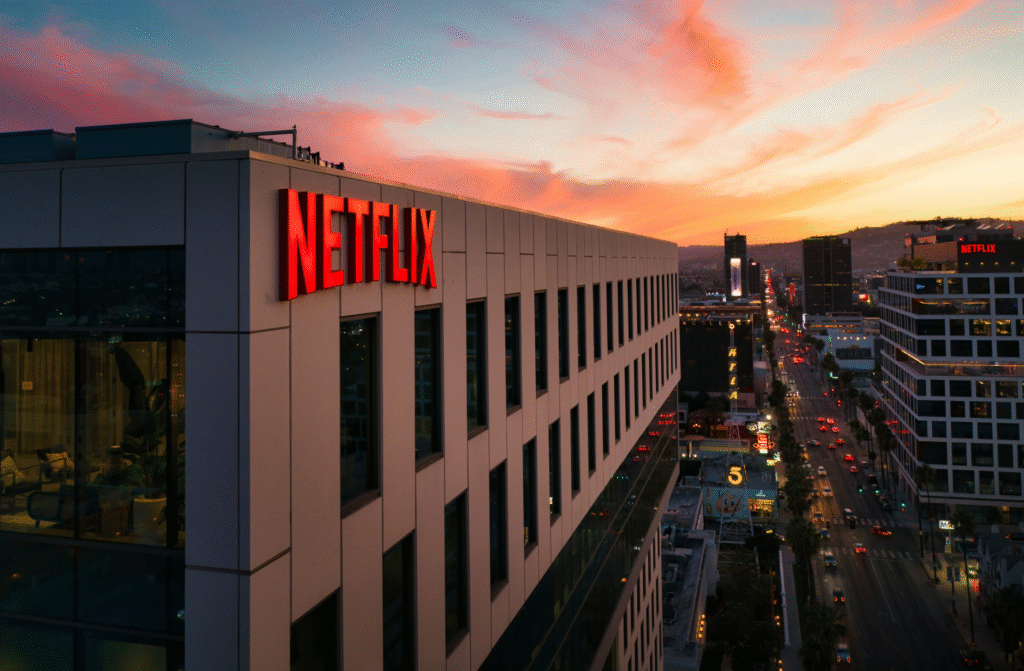Netflix has had a fantastic year, with its stock value jumping by $120 billion. But now comes the real challenge — proving that its new ideas like advertising and gaming can keep the company growing. With hit shows and big plans ahead, investors are watching closely to see if Netflix can maintain its winning streak.
“Entertainment is changing, and we’re changing with it.” That’s what many at Netflix believe as the company steps into a new phase of its journey. Once just a simple streaming platform, Netflix is now trying to prove that it can do more than just produce hit shows and movies. After a $120 billion rise in its stock market value this year, Netflix faces a big test — showing that its expensive investments in advertising and gaming can actually pay off.
Netflix has always been known for one thing — great content. Over the years, it has given the world popular shows like Stranger Things, Money Heist, and Wednesday. And now, it’s adding another big success to the list — KPop Demon Hunters, which has become Netflix’s most successful movie ever. This strong lineup is expected to push Netflix’s third-quarter revenue to its fastest growth in more than four years. Investors are excited but also cautious, wondering whether Netflix can keep up the pace or if its glory days might slow down.

The last few months of 2025 are also packed with powerful releases. Fans around the world are eagerly waiting for the final season of Stranger Things, a show that changed television forever. With this kind of content, Netflix clearly knows how to keep viewers hooked. But behind all the excitement, investors are asking one simple question — what comes next?
Earlier this year, Netflix made a surprising decision. It said it would stop sharing the number of subscribers it has. For years, this number was like a report card for the company — the higher the subscribers, the stronger the brand. But now, Netflix wants everyone to focus more on its financial results, such as revenue and profit, instead of just the number of users. This shift made many investors curious. Was Netflix hiding something? Or was it simply evolving beyond old ways of measurement?
Experts believe Netflix’s move signals a deeper transformation. The company doesn’t want to depend only on shows and movies anymore. Instead, it’s looking at new areas like advertising and gaming — both of which could become huge money-makers if done right. But these paths aren’t easy.
Take gaming, for example. Netflix entered the gaming world with high hopes. It bought several gaming studios and reportedly spent around $1 billion building its new business. The company now offers more than 120 mobile games — from classics like GTA: San Andreas by Rockstar Games to Netflix’s own titles based on popular shows like Squid Game: Unleashed. The idea was simple: keep users entertained even when they’re not watching a movie. But turning that dream into success has been harder than expected.
Analysts say Netflix’s gaming plans have faced bumps along the way. There have been changes in leadership, shifts in strategy, and uncertainty about whether Netflix can truly compete with giants like Sony or Microsoft. Gaming is not just about making fun games — it’s about building a strong fan base and understanding what players want. And Netflix, known for storytelling and visual magic, is still learning the ropes in this new field.
On the other hand, Netflix’s new advertising model seems to be finding its footing. After years of being ad-free, Netflix introduced a cheaper subscription plan with ads, hoping to attract price-sensitive viewers and advertisers at the same time. Many were unsure if people would accept ads on a platform famous for being ad-free. But surprisingly, it worked. Millions of new users joined the ad-supported plan, giving Netflix a fresh way to earn money. Big brands are now eager to work with Netflix because it offers something unique — a massive, engaged global audience.
Still, the question remains: can ads and gaming together bring the same magic that Netflix’s shows once did? Some investors think yes, but others worry that Netflix’s golden period of rapid growth might be fading. The competition is tougher than ever. Rivals like Disney+, Amazon Prime Video, and even YouTube are fighting for the same viewers. Every platform is pushing exclusive content, and audiences have more choices than ever before.
Despite all this, Netflix’s secret weapon remains its ability to reinvent itself. When it started, it mailed DVDs to homes. Then, it became the first big name in online streaming. Later, it turned into one of the most successful content creators in the world. Now, it’s aiming to blend entertainment with gaming and advertising — trying to become an all-in-one digital powerhouse.
Some analysts believe this boldness will help Netflix in the long run. As people spend more time online, the line between watching and playing is getting thinner. A fan could watch Stranger Things one moment and then play a game based on it the next. Netflix wants to own that entire experience. That’s why its big investment in gaming makes sense, even if profits take time to appear.
Investors, however, are watching carefully. They want proof that these costly new ideas can actually boost earnings. For now, Netflix’s numbers are still strong, and its shows continue to dominate pop culture. But growth in the streaming industry has slowed everywhere, and even Netflix cannot ignore that reality.
“Netflix is still the heartbeat of streaming,” said one analyst, “but now it needs to show it can be the heartbeat of more than just TV.” That perfectly sums up the challenge ahead. Netflix is no longer just fighting to keep subscribers — it’s fighting to prove that its next big adventure will be just as successful as its last.
As the company prepares to announce its third-quarter results, the world is watching closely. Will the new strategies pay off? Will gaming finally click? And can ads become the next big thing for a platform once known for being completely ad-free?
Only time will tell. But one thing is certain — Netflix is not afraid to take risks. Whether it’s changing how we watch, how we play, or how we experience entertainment, Netflix has always dared to lead rather than follow. And perhaps, that’s what will keep it shining — even in an uncertain future.








